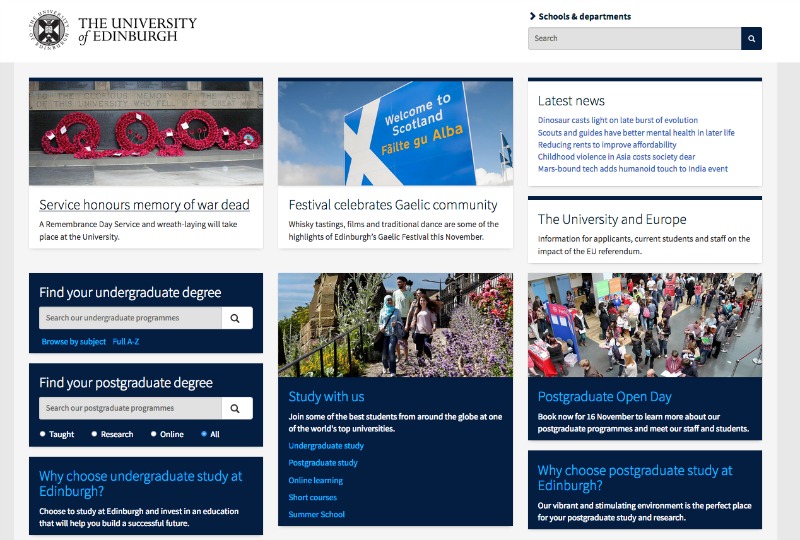Scottish Web Folk – insights into course search
On Friday 4 November, Carley and I attended Scottish Web Folk (SWF), a quarterly gathering of web team representatives from higher education institutions around Scotland. This time, SWF was held at the University of Strathclyde and chaired by Duncan Ireland from the University of the Highlands and Islands.
The universities which attended were Aberdeen, Abertay, Caledonian, Edinburgh, Glasgow, SRUC, Strathclyde, St Andrews, Sunderland and UHI.
The main topic area for the session revolved around content, particularly with course search. The meeting was relaxed and informal, with groups holding break-out discussions on the following topics:
- course landing pages (i.e. what is the first page you’ve designed for your users to hit and begin to explore your course offerings?)
- course pages – content, language, features, calls to action
- KIS widget – how to incorporate it, issues, etc.
- content required as part of the course selection journey – fees, accommodation, funding, applying, etc.
- house styles, brand and plain English
- review cycles and prompts
- ownership and responsibility
- user testing and research.
Duncan Ireland used Google Analytics data we sent him, as well as his own observations of our websites, to draw up a comparisons table of each university’s website. It became quickly obvious from the table that St Andrews is a major outlier compared to other Scottish universities, especially when it comes to course search.
Unlike most of the other universities’ websites, St Andrews does not link to its undergraduate course search directly from the homepage. And this notion made other universities look at us askance.

At the moment, users can most quickly navigate to course search from the homepage by going through Study>Undergraduate and then clicking on the course search call to action link at the bottom of the page.
This seems like a lot of steps to get to course search. However, this problem will soon be made redundant when we replace course search with subject pages. These subject pages will be sign posts for prospective students at all levels of study to find courses in their interested subject area.
And although we are mavericks in this, we are not the only university planning to take a subject-led approach over course search. Abertay stated that they too are planning to replace course search with subject-level pages.
We believe this is a progressive move which will get rid of a clunky and difficult-to-navigate system, and replace it with pages that not only sign-post to courses related to subject areas (which are key search terms by prospective students), but market the uniqueness of studying these subjects at St Andrews.
We plan to push these subject pages live, along with our redeveloped undergraduate pages, early next year. It will be interesting to track the traffic to these pages and to see if any more of our SWF friends will follow suit.